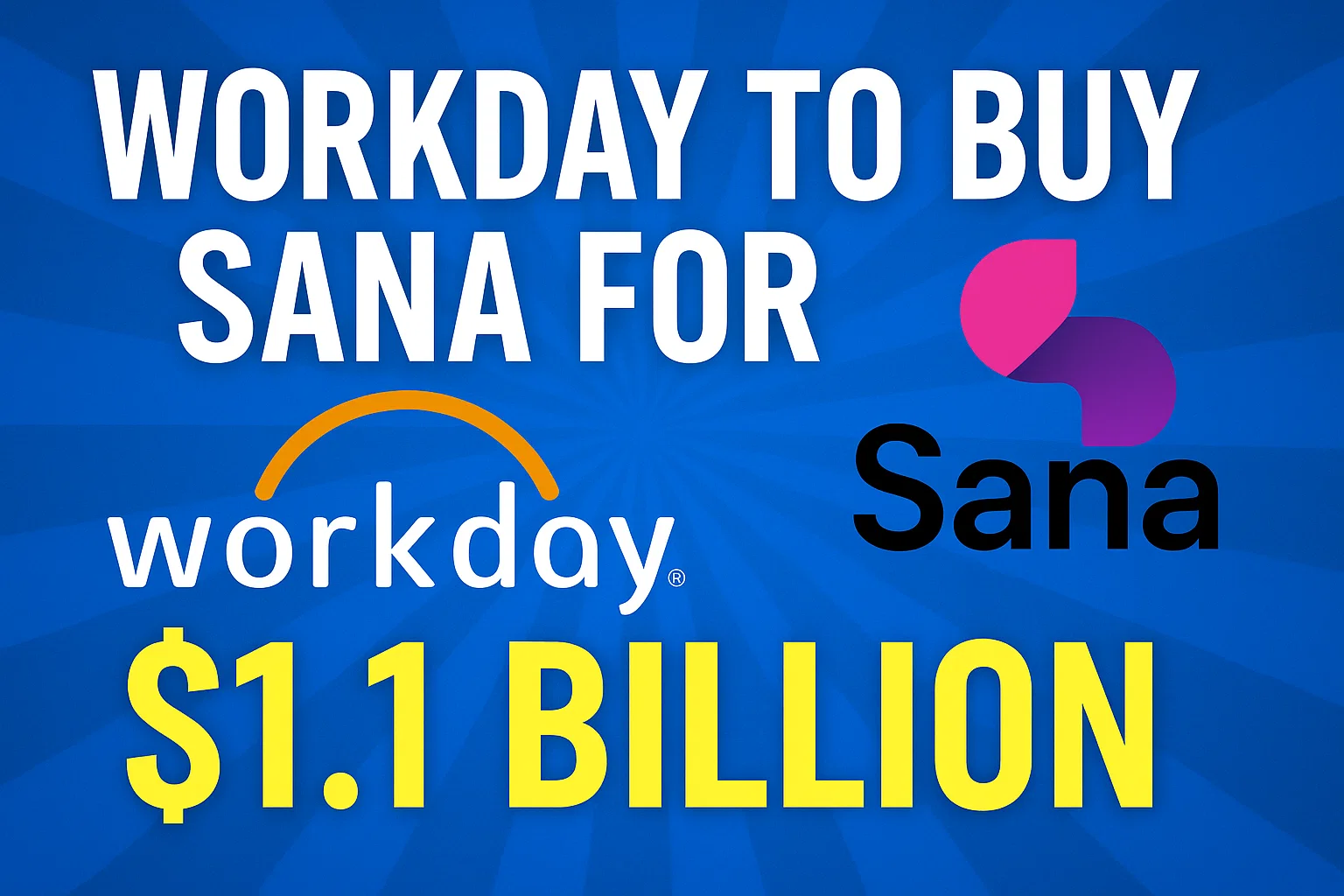Sana AI Joins Workday: What the Acquisition Means for Employee AI Tools

San Francisco, Sept. 16, 2025 — Workday announced that it will acquire Sana AI, a Stockholm-based startup known for its AI learning and knowledge platform, in a deal valued at about $1.1 billion. The agreement, revealed during the company’s annual Workday Rising event, highlights growing competition among enterprise software providers to embed generative AI directly into employee workflows (Reuters).
Sana’s Capabilities
Founded in 2016, Sana has built two flagship products: Sana Learn, an AI-powered learning management system, and Sana Agents, tools designed to automate repetitive tasks, summarize knowledge, and create personalized assistance across workplace applications. The company already serves more than one million users globally (Workday Investor Relations).
Sana’s platform enables employees to search across enterprise systems such as Google Drive, SharePoint, and Office 365 using natural language queries. It can also generate presentations, training content, and dashboards directly from company data (Josh Bersin).
Deal Timeline and Integration
The transaction is expected to close in Workday’s fiscal fourth quarter ending January 31, 2026, subject to regulatory approvals. Sana will continue to operate its existing tools while integrating with Workday’s broader HR and finance cloud applications. Co-founder and CEO Joel Hellermark will remain in leadership to guide the transition (Workday Investor Relations).
Must Read: Microsoft’s $30B UK AI Investment – Wider Context, Impacts, and Questions
Implications for Employee AI Tools
Workday executives said the acquisition will allow them to deliver “proactive, personalized, and intelligent employee experiences” by combining Sana’s technology with Workday’s existing datasets. For employees and managers, this could mean:
- Smarter enterprise search: Employees could ask questions in plain language and receive answers that span multiple platforms.
- Workflow automation: Routine HR processes such as onboarding or performance reviews could be drafted and executed by AI agents.
- Personalized learning: Training modules could be generated in days instead of months, tailored to employee roles and skills.
- Proactive insights: Workday could surface reminders, project knowledge, or skill gaps before employees request them.
Analyst Josh Bersin noted that the integration could reshape how employees access information at work, effectively turning Workday into a central hub for knowledge and learning (Josh Bersin).
Competitive Landscape
The acquisition comes amid intensifying competition in enterprise AI. Rivals such as Salesforce, SAP, and Microsoft are embedding AI agents into their platforms to support knowledge search, document generation, and HR workflows. Analysts say Workday’s purchase of Sana reflects a strategy to catch up and potentially leapfrog competitors by controlling more of the AI stack (Barron’s).
In recent years, Workday has also acquired smaller firms in areas like recruitment automation and workflow management. Adding Sana expands its reach into AI-driven learning and knowledge management, two areas where employee demand is accelerating.
Challenges Ahead
Despite the promise, Workday faces several challenges in executing the deal:
- Integration risks: Combining Sana’s platform with Workday’s enterprise systems will require careful engineering to maintain security and compliance.
- User adoption: Employees may resist new AI features if they disrupt established workflows or generate inaccurate results.
- Competition: With multiple vendors offering similar AI tools, Workday will need to demonstrate measurable productivity gains to differentiate.
- Cost justification: Enterprise buyers will expect proof that the acquisition delivers tangible value, not just experimental features.
Also Read: What Exactly Is Moflin AI Pet? A Good Alternative to a Real Pet?
What’s Next for Workday and Sana
Industry analysts see the acquisition as a pivotal move for Workday. By embedding Sana’s learning and automation technology, Workday aims to shift from being a system of record to becoming a system of intelligence — one that not only stores HR and finance data but actively guides employees with insights and actions.
For customers, the deal could result in faster onboarding, streamlined training, and less time spent searching for information. For Workday, it represents an opportunity to strengthen its competitive position in the fast-moving enterprise AI market.
Whether the $1.1 billion investment pays off will depend on how well the two companies integrate their platforms and how quickly enterprises embrace AI-driven employee tools. As AI becomes central to how work gets done, Workday’s bet on Sana may determine its role in shaping the next era of workplace technology.
